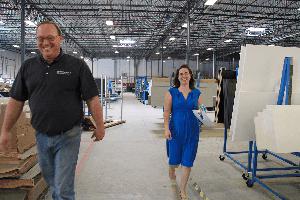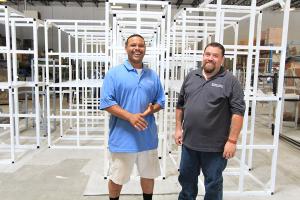What Makes a Good Manufacturing Project Manager: The Do's and Don'ts
How crucial is your project manager to your business? Read about the activities of project management and how they can have a large impact on the company!
Successful project management depends on the many decisions a project manager makes. Among all of these decisions are a few key things that a project manager should do.”
AUSTIN, TEXAS, UNITED STATES, July 3, 2018 /EINPresswire.com/ -- Project managers are a key component of making a manufacturing facility successful. They can affect everything from production rates and the cost of manufacturing to ergonomics and safety. — Formaspace
Think about just a few of the activities that require a project manager:
Production of enterprise project orders
Installation of a new production line
Expansion of existing production lines
Replacement of an obsolete piece of equipment
Installation of a new piece of equipment
The list of possible manufacturing projects is endless. There is no limit to how small a project can be, nor how large – project managers handle them all.
What Does a Project Manager Do?
The Project Management Institute (PMI) says that project management is “the application of knowledge, skills, tools, and techniques to project activities to meet the project requirements.” Put simply; a project manager is responsible for the success or failure of a project. It clearly is a challenging role.
In large facilities, there may be several full-time project managers. In smaller facilities, people who also have other duties may manage projects. It doesn’t matter if it is a full-time job, or whether a project manager has been formally trained – a successful project manager must be skilled in many areas, including communication, organization, and people management.
Project managers communicate with everyone from shop floor operators all the way up to top management. They must manage their own staff along with outside contractors. And, they must do all of this while keeping the project on schedule and on budget.
Whether you are an experienced project manager or new to the role, here are some project management tips to help make your manufacturing projects successful.
The Dos of Project Management
Successful project management depends on the many decisions a project manager makes. Among all of these decisions are a few key things that a project manager should do.
Do have a schedule with milestones
One of the first things a project manager should do is develop a schedule. The schedule does not need to be complex, but it should include milestones. Each project is unique, but some typical milestones are:
The decision to pursue the project
Project approval
Contracts signed and orders placed
Construction
Commissioning
Beneficial operation
If there isn’t a milestone schedule, it is not possible to track progress and thereby ensure the project will be completed on time.
Do take the time to generate an accurate estimate
Companies expect project managers to complete their projects close to the approved budget. The only way a project manager can do that is to start with an accurate estimate. Remember that there is often more to a project than just the equipment cost. Don’t forget things like new utility requirements for the equipment, such as electricity and compressed air.
Do understand your resources
Successful project management depends on the input from many different people. Understand whose assistance you need, both inside and outside the company, and ensure they are available.
Do frequently communicate with stakeholders
Make sure to keep all of your stakeholders informed about the project status. This is especially true when problems arise. If someone doesn’t have all the facts, they will automatically assume the worst.
It is also important to identify all of your stakeholders. The list of stakeholders can be quite large. Remember the definition of a stakeholder – anyone with an interest in the project. Even the janitor is a stakeholder if your project affects how he does his job.
Do talk with people on the shop floor
The best source of information for a project manager is the people who will operate and maintain the equipment. They can help the project manager arrange for downtime to install equipment. They can be a knowledgeable contact for the contractor when issues arise. They can even find design problems that the project manager can communicate to the design engineers.
Do understand the project risks
Every project has risks. Spend an hour or two with your project team and brainstorm risks. What happens if the equipment is late? What happens if the equipment is damaged during shipping? What if the project is not finished on time? What if the supplier raises their prices?
After you identify your risks, rank them according to how likely they are to occur and how severe the consequences will be. This will help you understand the areas of greatest concern. And, don’t forget to come up with a plan to mitigate the risks.
Although project managers often concern themselves with negative risks, there can be positive risks as well. What happens if you find a better vendor? What happens if the project is finished early? Think about ways to make positive risks happen.
Look at your list of risks throughout the project. Add to the list as you identify new risks, and check off the risks that are no longer present. It has been said that a project manager’s job is to worry. Your risk log tells you what to worry about. Successful risk management is an important part of successful project management.
Do understand schedule and cost contingencies
How does a project manager handle risk? Usually, they do it with contingencies. Contingency is something that is set aside for unexpected events. For a schedule, it is extra time. For a cost, it is extra money.
A project manager should base the amount of contingency on the risks identified and their probability of happening. Contingency is not just an arbitrary amount, nor is it a “padding” of the estimate.
Do learn from the past
Every manufacturing project1 is unique, but that doesn’t mean reinventing the wheel. Take the time at the end of a project to discuss with the project team what went well, and what didn’t go so well. Document what you have learned. Then, before your next project, look back on the learning from past projects. Repeat the good things, and find a way to avoid the bad ones.
Do consider earning the PMP certification
By earning the Project Management Professional (PMP) certification, a project manager demonstrates that they are competent to manage projects. The skills learned during the process of certification help project managers perform their role successfully.
The Don’ts of Project Management
A project manager must do many things. But, there are also some things that a good project manager should not do.
Brooke Turner
Formaspace
8002511505
email us here
1 https://formaspace.com/about/contact-us/#design_consultant


